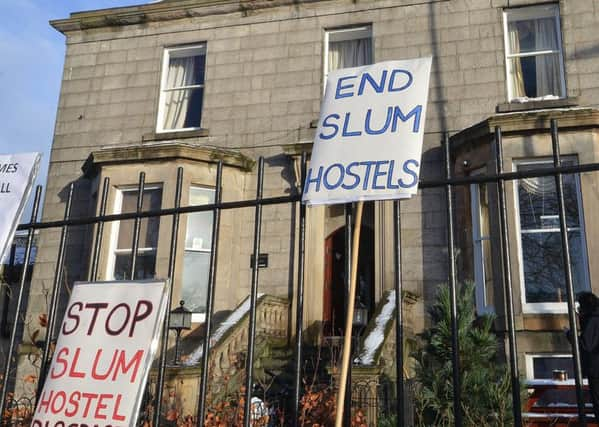Number of homeless Scots living in hostels soars


The study found almost a third of homeless households in Scotland are temporarily housed in either B&B or hostel accommodation, where concerns about the quality and appropriateness of temporary accommodation are most severe.
Experts warn that young or vulnerable people and those with complex needs fare particularly badly in these types of accommodation, where they may not be able to access the support they need and can be at risk of harm.
Advertisement
Hide AdAdvertisement
Hide AdThe number of households living in temporary accommodation (TA) doubled between 2003 and 2010, and has remained high ever since, with more than 10,000 people living in TA in Scotland on any one night.
The figures are contained in a report commissioned by Edinburgh-based social enterprise Social Bite for the Homelessness and Rough Sleeping Action Group (HARSAG), and written by Heriot-Watt University.
Experts are now calling for a range of measures to transform the TA system.
Josh Littlejohn, co-founder of Social Bite and member of HARSAG, said: “If we are to work towards an end to homelessness, then we must transform the temporary accommodation system where many of our most vulnerable people are forced to live.
“We know all too well from our experience of working with homeless people that when someone lives in the ‘homelessness system’ of hostels and B&Bs for a significant period of time, they become increasing marginalised, stigmatised and mental health challenges can worsen.
“Social Bite was delighted to commission this important piece of academic work which helps give a roadmap to transforming the homelessness temporary accommodation system for local and national government, and we commend the housing minister for embracing the recommendations that this study helped to shape.”
The report found that the length of time people are spending in TA is increasing while “unhelpfully high” rents are impacting on households’ ability to continue or move into work.
Single people and couples without children spend longer in B&Bs and, in particular, hostels.
Advertisement
Hide AdAdvertisement
Hide AdIn some local authorities, the average length of stay for single people in hostels exceeds 200 days.
The report also found that current TA funding regimes are inflexible and complicated.
Jon Sparkes, chief executive of national homelessness charity Crisis and chairman of HARSAG, said: “Temporary accommodation is not a housing solution, it is an emergency measure which should only be used while permanent housing is sought.
“When it is used, there should be the necessary support available for each person, the quality should be of at least a minimum enforceable standard and where basic provisions are not met then people should not have to stay for more than seven days.”
The report suggests a range of measures to transform TA, including overhauling homelessness prevention policy to reduce demand for temporary accommodation and measures to improve the quality and appropriateness of TA.
Housing minister Kevin Stewart said: “I welcome the action group’s 21 bold and visionary recommendations on how to transform the use of temporary accommodation so that the system works well for people.
“The recommendations will play a vital role in helping us meet our pledge to transform temporary accommodation and end homelessness, backed by our £50 million Ending Homelessness Together Fund.
“I am also committed to ensuring that we keep engaging with people who have direct experience of homelessness, front line workers and service providers to take these recommendations forward in partnership with local government.”